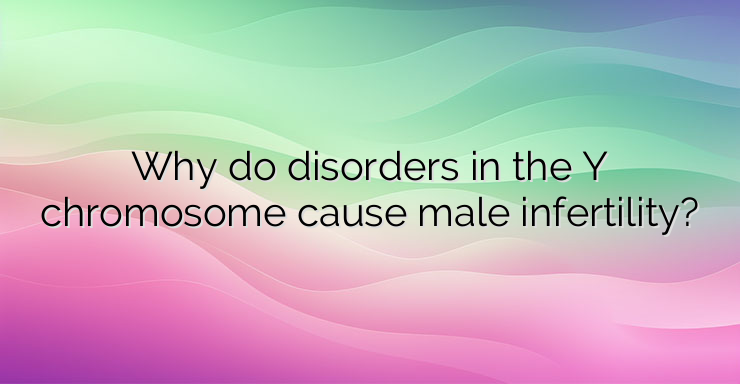The genes located on the Y chromosome are essential for spermatogenesis and the proper development of the male gonads. Y-linked infertility is a disorder that affects the production of semen, such that the affected man’s body fails to produce mature sperm (azoospermia), produces fewer than the usual number of sperm (oligospermia), or produces sperm that are of an abnormal shape or that do not move properly. Men suffering from Y-chromosome infertility experience no other signs or symptoms associated with the condition. Infertility associated with disorders of the Y chromosome occurs in approximately 1 in 2,000 to 1 in 3,000 men of all ethnic groups. Microdeletions of the Y chromosome are the leading genetic cause of male infertility, with a prevalence of 10-15% in cases of non-obstructive azoospermia and 5-10% in cases of severe oligospermia. Some men with Y-related infertility who experience mild to moderate oligospermia may eventually father a child naturally. Men with oligospermia can also be helped with assisted reproductive technologies. Normally, a person has 46 chromosomes in each cell. Two of the 46 chromosomes are sex chromosomes, called X and Y. Females have two X chromosomes (46, XX) and males have one X chromosome and one Y chromosome (46, XY). Many genes on the Y chromosome are involved in male sex determination and development. In particular, genes in regions of the Y chromosome called azoospermia factor (AZF) regions provide instructions for synthesizing proteins that are involved in sperm production and development, although the specific functions of these proteins are not well understood. Y-linked infertility is caused by deletions (losses of sections of a chromosome) of genes in the AZF regions. These deletions remove several genes or, in rare cases, a single gene. Loss of this genetic material probably prevents the production of one or more proteins necessary for normal sperm development. As a result, either few or no sperm develop, resulting in Y-chromosome infertility. Because infertility associated with disorders in the Y chromosome hinders the ability to conceive, this condition is not usually inherited. Most cases of this disorder are the result of new (de novo) deletions of the Y chromosome that occur during sperm formation in the father of the affected person who does not suffer from infertility per se. These cases occur in men with no family history of the disorder. When men with Y-chromosome infertility manage to produce offspring, either naturally or with the help of assisted reproductive technologies, they pass the genetic changes on the Y-chromosome to all their sons.As a result, their sons also developed Y-chromosomal infertility. This form of inheritance is called Y-linked. Daughters do not inherit the Y chromosome and are unaffected. References: 1. Esteves SC, Agarwal A. Novel concepts in male infertility 2. Gallego A, Rogel R, Lujan S, Plaza B, Delgado F, Boronat F. AZF gene microdeletions: case series and literature review 3. Goncalves C, Cunha M, Rocha E, Fernandes S, Silva J, Ferraz L, Oliveira C, Barros A, Sousa M. Y-chromosome microdeletions in nonobstructive azoospermia and severe oligozoospermia 4. Krausz C, Casamonti E. Spermatogenic failure and the Y chromosome 5. Liu XG, Hu HY, Guo YH, Sun YP. Correlation between Y chromosome microdeletion and male infertility


Leave a Reply